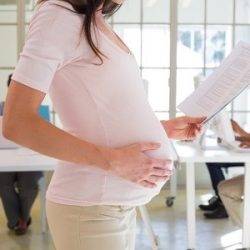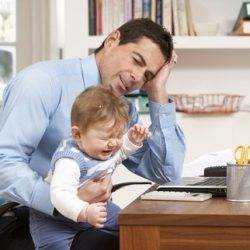January 25, 2019
Government announces protections for pregnant mums and new parents returning to work
 Pregnant women and new parents returning to work after having children are to be further protected from unfairly losing their jobs under new proposals set out by the UK government. The consultation, launching today (25 January 2019) and running to 5 April, proposes that the legal protection against redundancy for pregnant women and new mothers on maternity leave is extended so that it continues for up to 6 months after they return to work. It will also seek views on affording the same protection to parents returning from adoption leave or shared parental leave.
Pregnant women and new parents returning to work after having children are to be further protected from unfairly losing their jobs under new proposals set out by the UK government. The consultation, launching today (25 January 2019) and running to 5 April, proposes that the legal protection against redundancy for pregnant women and new mothers on maternity leave is extended so that it continues for up to 6 months after they return to work. It will also seek views on affording the same protection to parents returning from adoption leave or shared parental leave.















 Three-quarters (74 percent) of HR managers have witnessed discrimination in the recruitment process – with a quarter (24.5 percent) calling it a regular practice; and less than a third of HR managers (32 percent) can confidently say they are unprejudiced themselves during the recruitment process. According to research from digital recruitment platform SomeoneWho, almost half (48 percent) admit bias impacts their candidate choice, while a further fifth (20 percent) said they couldn’t be sure. The research also found that female candidates face a number of stigmas when looking for work. One in 10 recruiters said they would avoid a female applying for a male dominated role. A further one in 10 said they’d be reluctant to recruit a recently married candidate, as they were more likely to go on maternity leave soon. Shockingly, a fifth of HR managers said they would overlook a pregnant candidate. One in 10 HR managers would be reluctant to hire someone with a thick accent. A further 10 percent said they’d be less likely to select candidates who attended a state school.
Three-quarters (74 percent) of HR managers have witnessed discrimination in the recruitment process – with a quarter (24.5 percent) calling it a regular practice; and less than a third of HR managers (32 percent) can confidently say they are unprejudiced themselves during the recruitment process. According to research from digital recruitment platform SomeoneWho, almost half (48 percent) admit bias impacts their candidate choice, while a further fifth (20 percent) said they couldn’t be sure. The research also found that female candidates face a number of stigmas when looking for work. One in 10 recruiters said they would avoid a female applying for a male dominated role. A further one in 10 said they’d be reluctant to recruit a recently married candidate, as they were more likely to go on maternity leave soon. Shockingly, a fifth of HR managers said they would overlook a pregnant candidate. One in 10 HR managers would be reluctant to hire someone with a thick accent. A further 10 percent said they’d be less likely to select candidates who attended a state school.


 A new piece of academic research provides more evidence that the underlying reason for the gender pay gap is the discrepancy between the way women with children are treated compared to men, and other women without children. According to new research from Université Paris-Saclay, mothers are paid 3 percent less for every child they have compared to their female colleagues who do not have children, while fathers suffer no such penalty at all. The figures were compiled from a 16-year study of data from organisations in the French private sector between 1995 and 2011 by Lionel Wilner, Director of Graduate Studies at engineering and statistics school ENSAE, a founding member of Université Paris-Saclay. He separated the effect of childbirth from other firm-specific wage determinants, and accounted for full-time and part-time work, to find that the difference between mothers and non-mothers is approximated a 3 percent lower hourly wage. The effect was found to be more pronounced after the birth of the first child.
A new piece of academic research provides more evidence that the underlying reason for the gender pay gap is the discrepancy between the way women with children are treated compared to men, and other women without children. According to new research from Université Paris-Saclay, mothers are paid 3 percent less for every child they have compared to their female colleagues who do not have children, while fathers suffer no such penalty at all. The figures were compiled from a 16-year study of data from organisations in the French private sector between 1995 and 2011 by Lionel Wilner, Director of Graduate Studies at engineering and statistics school ENSAE, a founding member of Université Paris-Saclay. He separated the effect of childbirth from other firm-specific wage determinants, and accounted for full-time and part-time work, to find that the difference between mothers and non-mothers is approximated a 3 percent lower hourly wage. The effect was found to be more pronounced after the birth of the first child. 












January 3, 2019
Anti-team legislation can make us slaves to individual rights
by Helen Jamieson • Comment, Flexible working, Workplace
Society is becoming more selfish. At least that’s what the most commonly held view on the issue suggests, and it’s only set to get worse. Whether or not you believe the headlines, my 20 plus years’ experience as an HR consultant has led me to believe the hype. Increasingly many (I stress, not all) employees no longer see themselves as part of a team, but are increasingly ‘lone wolves’ single mindedly pursuing their needs and wants above those of the team. Each decision they make is with ‘I’ first and foremost, with ‘we’ maybe just a passing thought. It could be argued this was inevitable. How do you create a culture of team engagement, and group morale when for decades UK workplace legislation has focused almost exclusively on Individual Rights, rather than the ‘rights’ of the group? I’d argue it is simply not possible to develop successful teams where each individual has numerous legal rights but no corresponding responsibilities. My wish for 2019 would be for the government to set out a ‘responsibility’ alongside every ‘right’ it confers.
(more…)